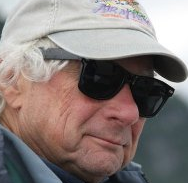The Iraq War: A Surprising, But Much Needed Campaign Issue
By Joe Rothstein
Editor, EINNews.com
I’ll let you in on a secret: My favorite card trick. Try it on your friends. They will be astounded.
Start by shuffling the deck in a way that allows you, unobtrusively, tosee the identity of the bottom card. Let’s say it’s the 3 of hearts. Place the deck face down and ask the unwary to pick two suits. If they pick hearts and clubs, ask him or her to pick one of those. If the choice is clubs, say “that leaves hearts.” Then ask for four numbers between 2 and 10. If one of the numbers picked is 3, (for instance, 2,3,4 and 5), ask to pick two of those. If one of them isn’t a 3, (2, 4, 6 and 8), say “that leaves 3, 5, 7. 9 and 10.
Get the idea? You know the card you want them to finally settle on, so you ask a series of questions that gets you there. Through manipulation of your questions you get what seems to be a logical answer. An answer you wanted from the beginning.
This trick isn’t limited to cards. In 1964, Lyndon Johnson’s White House and military establishment wanted to ramp up military action to defeat North Vietnam’s threat to South Vietnam. So they played this trick: fake a North Vietnamese gunboat attack on a U.S. ship in the Gulf of Tonkin, off the Vietnamese coast. Question: How can the U.S. allow Hanoi to attack the U.S. Navy without retribution? Answer: Of course we have to fight back. The trick was so convincing that they were able to con the U.S. Senate into passing a resolution giving the White House a blank check to go to war. Only two U.S. senators voted against that resolution.
We know from the archives, from Vietnamese authorities and from mountains of evidence that there was no gunboat attack. In fact, any shots fired likely came from a U.S. ship warning the North Vietnamese gunboats to keep their distance.
More than 55,000 American servicemen and women died in the Vietnamese war, hundreds of thousands were wounded, millions of Vietnamese, Laotians and Cambodians lost their lives. It all ended in humiliation for the U.S., a horrible legacy for many who served there and their families, and a financial debt from which the U.S. is yet to recover.
In 2002, George W. Bush’s White House played the same trick. Saddam Hussein supposedly was on the verge of having a nuclear bomb, or missiles capable of delivering poison gas, or was secretly behind the 9/11 attack on New York and Washington, D.C. The warmongers knew the card at the bottom of the deck. For any number of their own reasons they wanted to destroy the Hussein regime. Question: How can we stand by and let this menace grow? Answer: We can't. They steered every card in that direction, knowing that much of what they were arguing was just plain trickery.
While my card trick wows people the first time they see it. Repetition of it leads to awareness of how it’s done. People notice my questions are not always the same. Instead of “pick two of those,” they notice that I’ve change the game to “that leaves...” Eventually most catch on.
As for Vietnam and Iraq, most of us have caught on. It’s not hard, because many of those who were directly involved have confessed. Robert McNamara tried for most of his years after serving as Defense Secretary to apologize for Vietnam. The Pentagon Papers leave little doubt that the excuse for that war and the cover-ups that extended it were fiction. The libraries are filled with books and personal testimony verifying the stunning deceptions.
A similar scenario played out with Iraq. No nuclear weapons. No chemical weapons on the tips of medium or long range missiles. No evidence of any kind of coordination with al Qaeda. But we do know that our own intelligence community had plenty of doubts about all this at the time that President George W. Bush, and Donald Rumsfeld, and Vice President Cheney were assuring us that the case against Hussein was air tight. We know the Saudis and others tried hard to dissuade an attack, rightly identifying Hussein’s posturing as bluster to keep from losing face with Iran and others in the Middle East.
When someone finally nails how I do my card trick we all just laugh about it. But what happens when we figure out a Vietnam or an Iraq? Not much. And that’s a tragedy. Not just a tragedy because we should be seeking retribution from people who are, in fact, war criminals, but more importantly, there’s little disincentive not to kill again.
A few war crimes trials or at least high visibility truth commissions that placed responsibility firmly where it belonged for the Vietnam tragedy could well have headed off a repeat version of it in Iraq. And the fact that we’re not having such an accounting for Iraq makes it that much easier to do it one more time in Iran or North Vietnam or anywhere else the wrong set of leaders decide to go to war.
That all became horrifying clear in recent days after two events.
We learned that Jeb Bush, who is the favorite to win the Republican presidential nomination and could well be our next President, is blind to the history of the Iraq war. This is not just brotherly love. His foreign policy advisors include many who likely would have been indicted or publicly humiliated by any serious attempt to place responsibility for the lies and deceptions that led us into upending the entire Middle East.
And while Bush finally had to admit that Iraq maybe wasn’t such a good idea, Karl Rove was stoutly defending the decision to invade. Rove’s only regret is that we’re not still there. In answer to an Iraqi war veteran’s question during an appearance at the University of Connecticut, Rove said:
“It was right to remove Saddam Hussein from power. He had thumbed his nose at the international community, which had passed at the United Nations 14 resolutions. Fourteen times he gave the finger to the U.N. He was a state sponsor of terrorism and in aftermath of 9/11 he represented a threat. We should have stayed there and remained there like the Iraqis wanted us to.”
Rove is a very smart guy. So I’m not going to demean his intelligence by pointing out that the UN did not authorize an invasion of Iraq and that we now know for certain what the Bush White House knew at the time: Hussein was not a threat to the U.S. As for remaining there, the Iraqis (and the American public) not only wanted us out, they refused an agreement that would have allowed us to maintain a token group of military trainers. I’m not going to question Rove’s intelligence, just his honesty.
Rove gets up to $50,000 a speech and his uncompromising position likely will result in a lot more speeches from right wing groups and a lot more sales for his current book.
Tragically, Rove is not alone in thinking the U.S. should police the world, even in places we’re not wanted. And if the American people don’t like it, scare the daylights out of them and tell any lies until they see it your way. Sort of like modifying public opinion through psychic waterboarding.
Between them, Bush and Rove have picked off an ugly scab from the U.S. past and reopened the wound of Iraq. Hopefully, others will take that opportunity to do what’s needed to heal that wound, not just cover it up again, and to build a public constituency that won’t fall for their tricks one more time.
(Joe Rothstein can be contacted at joe@einnews.com)




